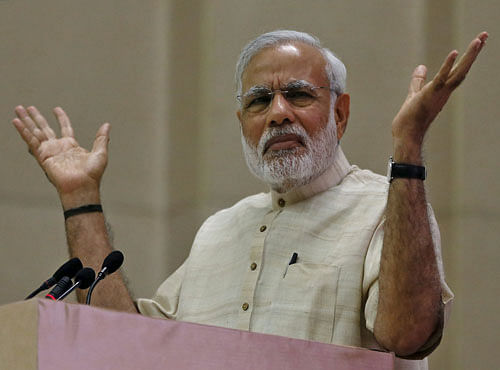
Facing resistance to labour reforms from within, Prime Minister Narendra Modi today said changes in the laws will be made only after consensus and stressed that "obsolete and unnecessary" laws are being weeded out.
Addressing the 46th Indian Labour Conference, he said there is a thin line that separates the interest of workers and their unions and the same should be respected.
"Efforts would be made to modify labour laws through consensus," the Prime Minister said, adding that the consultation process with trade unions would continue.
Modi further said that the "obsolete and unnecessary" laws were being weeded out as part of the government's objective to achieve "minimum government and maximum governance".
The government has set up a high-level inter-ministerial committee under Finance Minister Arun Jaitley to evolve a consensus on labour reforms. The first meet, which was held yesterday, failed to make any substantive headway.
Talking about different interest groups, Modi said that there was a thin line dividing the interest of industry and industrialists, government and nation, and labour and labour organisations.
Often, one talks about saving the industry but ends up protecting industrialists, he said, adding that there is a need to recognise this thin line and adopt a balanced approach to the deal with the issues and change the environment.
Jaitley in his address warned of a threat to job creation if investments were blocked and appealed to the trade unions not to persist with ideas that harm economic activity.
"If we stop the fountain of investment, then employment will not increase, then economic activity will also not increase. And it becomes a threat to existing jobs," he said.
Reflecting signs of discord, National President of the BJP-affiliate Bharatiya Mazdoor Sangh (BMS) B N Rai attacked government for pursuing "few wrong policies" and stressed the trade unions will not allow reforms "at the cost of labour".
BMS, one of the biggest trade unions in the country, also demanded withdrawal of the industry-friendly factories Act enacted by BJP-ruled Rajasthan government as also the new labour laws by the Centre.
Modi expressed concern that the number of apprentices in the country is very low and asked the industry to provide more opportunities to them to increase their numbers from 3 lakh to at least 20 lakh.
The number of apprentices in China is 2 crore, Japan - 1 crore and Germany - 30 lakh as against only 3 lakh in India, he said.
"If we want to move ahead, we need to give opportunities to our youth. Giving opportunities to apprentices is the need of the hour," Modi said, adding that there is a need to focus on people who are unemployed.
The Prime Minister underlined the need for encouraging and recognising innovations at every level by the industry as well as the government.
"Nobody recognises the capacity of labourers to innovate. I have to change this atmosphere," he said.
Modi said the government, industry and trade unions would have to think about ways to improve respect for workers.
The government would give certificates to workers having traditional skills as part of the initiatives to recognise their importance, he added.
Observing that country cannot remain happy if labourers are unhappy, Modi said they contribute immensely for nation building and businesses cannot run properly in absence of cordial relation between workers and employers.
The Prime Minister also expressed concern over the lack of respect for the workers in Indian society.
"There is a wrong habit which has crept in, we do not respect our labour enough, he said," adding that the law is needed for those who do not treat labour as fellow human beings.
He also made a case for simplification of the labour laws which currently are complex and can be interpreted by all stakeholders for their own benefit.
"It is my effort to simplify the laws so that even the poorest are able to understand their rights and avail them," Modi said.
The Prime Minister said that he has seen poverty and does not need to take camera persons to see poverty.
"I have seen and experienced poverty, I do not need to go somewhere with a cameraman to know about poverty," Modi said.